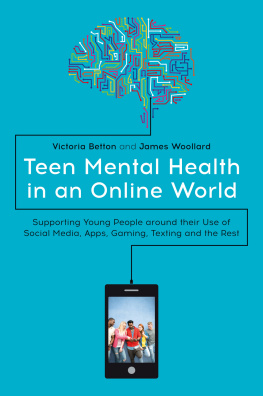THE HAPPINESS EFFECT
THE HAPPINESS EFFECT
HOW SOCIAL MEDIA IS DRIVING A GENERATION TO APPEAR PERFECT AT ANY COST
DONNA FREITAS
FOREWORD BY CHRISTIAN SMITH


Oxford University Press is a department of the University of Oxford. It furthers the Universitys objective of excellence in research, scholarship, and education by publishing worldwide. Oxford is a registered trade mark of Oxford University Press in the UK and certain other countries.
Published in the United States of America by Oxford University Press
198 Madison Avenue, New York, NY 10016, United States of America.
Donna Freitas 2017
All rights reserved. No part of this publication may be reproduced, stored in a retrieval system, or transmitted, in any form or by any means, without the prior permission in writing of Oxford University Press, or as expressly permitted by law, by license, or under terms agreed with the appropriate reproduction rights organization. Inquiries concerning reproduction outside the scope of the above should be sent to the Rights Department, Oxford University Press, at the address above.
You must not circulate this work in any other form and you must impose this same condition on any acquirer.
Library of Congress Cataloging-in-Publication DataNames: Freitas, Donna, author.
Title: The happiness effect : how social media is driving a generation toappear perfect at any cost / Donna Freitas ; foreword by Christian Smith.
Description: Oxford ; New York : Oxford University Press, [2016] | Includes bibliographical references and index.
Identifiers: LCCN 2016009997 (print) | LCCN 2016016495 (ebook) | ISBN 9780190239855 (cloth : alk. paper) | ISBN 9780190239862 (updf) | ISBN 9780190239879 (epub)
Subjects: LCSH: Internet and youth. | Social mediaPsychological aspects. |YouthSocial life and customs.
Classification: LCC HQ799.2.I5 F745 2016 (print) | LCC HQ799.2.I5 (ebook) |DDC 004.67/80835dc23
LC record available at https://lccn.loc.gov/2016009997
This book is dedicated to Katie, Andleeb, Ozzie, Cristianna, and Dion, the extraordinary students in my Hofstra memoir seminar. You struggled together to think about the biggest and most important of lifes questions with openness and honesty, and allowed me to be present for this. You made me laugh and reflect and wonder at my luck in having you all in class. I am so proud of everything that youve become.
CONTENTS
Margaret has to avoid Facebook because seeing how happy everyone else appears online makes her unhappy by comparison. Rob gets a call from a friend asking him to Like his new Facebook photo to save him from the possibility of it not being liked enough. Michael felt lonely because he spent most of high school trying to impress people on social media rather than spending time with his friends. These are just a few of the people you will meet in this book. And it is tempting to ask: Whats the matter with kids today?
Everybody knows that the digital communications revolutionthe Internet, social media, smartphones, online dating, and moreis transforming our society. But nobody really knows yet how these technological innovations are changing us and our ways of lifepossibly including our very sense of selfand just how far it will go. We have lived long enough with this revolution by now to know that it is truly revolutionary, not a superficial phase. But we have not lived with it long enough to know what it really means for us in the long run.
Everywhere I travel to speak about the lives of youth, I am asked how the Internet, and social media, and smartphones are changing young peoples livesusually, it is suspected, for the worse. Is it making them less interested in real, face-to-face relationships? Is it turning them into self-centered egomaniacs? Is it causing them to disconnect from social institutions, like sports teams and churches? Is it distorting their sense of morality? As a sociologist, ever attentive to data, I have always had to answer that I dont really know, because there wasnt enough good research available. I think the changes are real and big, I would say, but beyond that I could only speculate. My answers were always incomplete and disappointing.
You now have in your hands a landmark book that answers these questions. Donna Freitass The Happiness Effect provides the first really serious and reliable answers to these kinds of questions that parents ask every day. As a researcher, I am very excited about it, even as I find it troubling as a parent. Unlike a lot of writing in this area, this book is neither speculation nor sensationalism. It is serious, focused on a hugely important issue, and based on rock-solid empirical evidence. Freitas elegantly interprets the datamostly by allowing young people to speak for themselvesin clear and accessible prose that is rare among academic writers. It deserves and needs to be widely read.
One of the most important findings in this book, to my mind, is the schizophrenic effect social media has on peoples sense of self. Social media produces a world in which the problems and blemishes of real life are hidden behind virtual presentations of self that struggle, often obsessively, to be Liked. One must always appear attractive, happy, and clever. And, as Freitas deftly shows, even while many users grasp the dehumanizing forces at work here, they find it difficult to keep themselves from playing into this virtual worlds insidious grasp on human insecurities and fears. The damage is perpetrated mostly by the same people who suffer them. It is troubling to anyone who wishes to see young people growing up to be authentically secure, happy, realistic, and genuinely caring about the real needs of other people.
The pages that follow skillfully reveal the sometimes subtle, sometimes blatant ways that social media twist and distort young peoples senses of self. I have seen hints of this in my own research, but this book nails it with force and insight. When I interviewed young people, smartphones and Facebook continually interrupted, metaphorically and sometimes literally. I knew social media was an essential topic. This book, which brings us inside the intimate thoughts and feelings of youth struggling to develop authentic senses of themselves, yet also wrestling to negotiate the immense pressures that social media places on them, provides answers to longstanding questions.
As to the author, Donna Freitas is one of the most qualifiedperhaps the most qualifiedscholar in the nation to write this book. She has spent years traveling all over the United States talking directly with many hundreds of students at every kind of college and university, about their experiences online, their personal and social identities, relationships, intimate emotions, sexual histories, views of their own generation, and much more. Freitas has profoundly and personally immersed herself in the worlds of which she writes and speaksan up-close and labor-intensive research method for which there is no substitute. That gives her an unrivaled authority to write about these matters, one that deserves our hearing. Freitas is also an immensely talented interviewer, speaker, and writer. And, while she is adept at writing for and speaking to popular audiences, Freitas is a serious scholar who is careful about research methodology, data collection, and analysis. All of this makes her a rare combination of talents.











